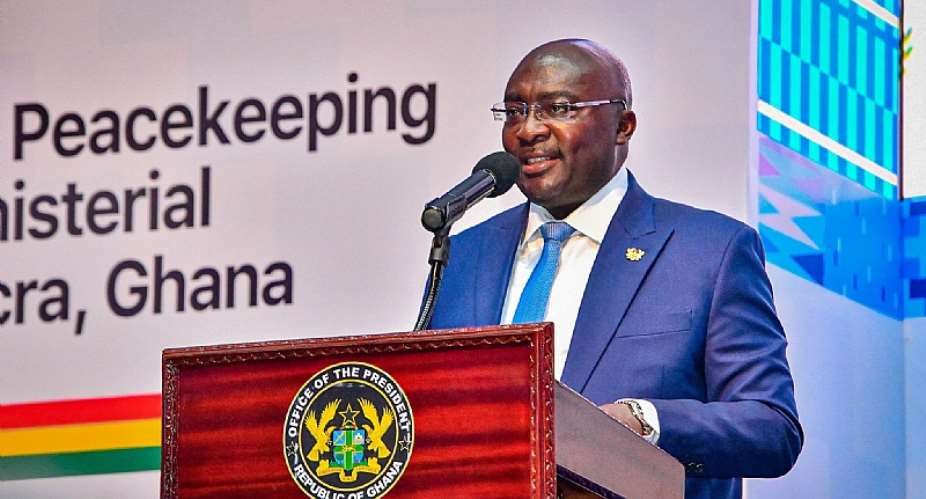President Nana Akufo-Addo’s promise to transform Ghana's economic landscape faced unexpected challenges during his nearly eight-year administration. Despite initial optimism, a turn of events left the nation grappling with economic hardships. In this context, the focus has shifted to the potential candidacy of Dr. Mahamudu Bawumia, the current vice president, as the flagbearer for the New Patriotic Party (NPP) in the 2024 elections. What can Dr. Bawumia employ to rejuvenate Ghana’s economy if elected?
Diversification of the Economy
To address Ghana’s economic challenges, Dr. Bawumia’s administration must prioritize diversification. Ghana’s heavy reliance on the export of primary commodities makes it vulnerable to market fluctuations. By investing in and promoting sectors like manufacturing, technology and services, the country can reduce this vulnerability. Policies supporting growth in industries such as technology and renewable energy, along with incentives like tax breaks and streamlined regulations, will be essential. Besides, infrastructure development that supports diverse industries will play a pivotal role in this transformation.
Investment in Education and Skill Development
A well-educated and skilled workforce is crucial for sustained economic development. Dr. Bawumia’s government should invest in education and vocational training programmes to equip the population with skills relevant to the modern job market. Increasing funding for education at both primary and tertiary levels and collaborating with the private sector for industry-aligned training programmes will be key. Implementing policies that encourage continuous learning and upskilling will contribute to a more dynamic and competitive workforce.
Infrastructure Development
Robust infrastructure is a cornerstone of economic growth. Dr. Bawumia’s administration must prioritize the improvement of transportation, energy and communication infrastructure. Investments in roads, bridges, ports and energy projects will enhance productivity, attract foreign direct investment, and ensure a reliable power supply. Upgrading digital infrastructure is equally vital to improve connectivity and access to information, fostering overall economic development.
Modernizing Agriculture and Ensuring Food Security
Recognizing the significant role agriculture plays in Ghana’s economy, Dr. Bawumia’s government should focus on modernizing the sector. Investing in modern farming techniques, irrigation systems, and agribusiness infrastructure can boost productivity, create jobs and enhance food security. Providing farmers with access to credit, technology and market information, along with supporting sustainable agricultural practices and value addition to products, will contribute to the sector’s revitalization.
Good Governance and Anti-Corruption Measures
Transparency, accountability and the fight against corruption are paramount for creating a conducive business environment and attracting foreign investments. Dr. Bawumia can strengthen anti-corruption laws and institutions, encouraging transparency in government transactions and procurement processes. Regular audits of government activities will foster a culture of accountability, ensuring efficient and corruption-free governance.
Conclusion
Dr. Mahamudu Bawumia stands at the threshold of leadership with the potential to reshape Ghana’s economic landscape. By focusing on diversification, education, infrastructure, agriculture and governance, he can pave the way for a more prosperous future. Ghanaians eagerly anticipate the positive changes that could emerge under his visionary leadership.





 4,300 Liberians at Buduburam Refugee Camp to return home
4,300 Liberians at Buduburam Refugee Camp to return home
 Two dead in premix fuel depot explosion at Essikado-Ketan
Two dead in premix fuel depot explosion at Essikado-Ketan
 Driver of President Akufo-Addo convoy SUV dies in road crash
Driver of President Akufo-Addo convoy SUV dies in road crash
 Akufo-Addo's convoy in fatal crash
Akufo-Addo's convoy in fatal crash
 Mepe flood victims still in tents 8months after Akosombo Dam spillage
Mepe flood victims still in tents 8months after Akosombo Dam spillage
 Kpemka’s appointment as Deputy BOST MD is unconstitutional – Kwabena Donkor
Kpemka’s appointment as Deputy BOST MD is unconstitutional – Kwabena Donkor
 Voter registration: Two Togolese Nationals arrested in Buem for attempting to re...
Voter registration: Two Togolese Nationals arrested in Buem for attempting to re...
 DR Congo thwarts Kinshasa 'coup attempt': army
DR Congo thwarts Kinshasa 'coup attempt': army
 Media has made good progress in Ghana — Frema Opare
Media has made good progress in Ghana — Frema Opare
 Election 2024: NDC pledges to scrap betting tax, targets 80% youth support
Election 2024: NDC pledges to scrap betting tax, targets 80% youth support
